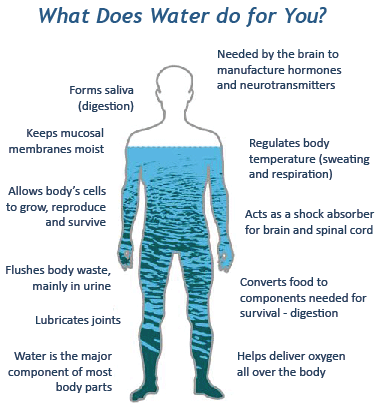Natural Ways to Build a Strong Immune System
Whether you’re a frontline worker or working from home while trying to homeschool three kids, it is more important than ever to stay healthy and operating on all cylinders. Botton line: your life needs you healthy. While there is no magic pill to ward off illness, there are a few tried-and-true ways to keep your immune system humming:
Eat More Fruits & Veggies
Your mother has been telling you to eat more fruits and veggies since you were too short to ride rollercoasters. As it turns out, there might have been some science behind all of mom’s nagging.
 Whole foods like fruits, vegetables, seeds, nuts, and beans are nutrient-dense and rich in antioxidants. Antioxidants help decrease inflammation which has been linked to a myriad of chronic health conditions including heart disease, diabetes, cancer, arthritis, and obesity.5
Whole foods like fruits, vegetables, seeds, nuts, and beans are nutrient-dense and rich in antioxidants. Antioxidants help decrease inflammation which has been linked to a myriad of chronic health conditions including heart disease, diabetes, cancer, arthritis, and obesity.5
Only 1 out of every 10 adults meet the daily recommended servings of fruits and vegetables.6 But when you have a busy life and a tight schedule, how do you manage to get healthier food on your plate?
- Make a plan. Keep track of how many fruits and veggies you currently eat in a day. Then make a plan to slowly increase that amount. Swap that afternoon chips & dip for celery and hummus. Or maybe instead of fries on the side, you opt for a side salad. Small changes add up over time. Most adults should aim for 2-3 cups of vegetables8 and 1-2 cups of fruit per day.7
- Start with Breakfast: If you’re aiming to pack more nutrients into your day, it's worth starting the day off right. Try adding diced apples to your morning oatmeal or include mushrooms or tomatoes to your morning omelet for a savory breakfast.
- Buy prepared: If all the chopping, peeling, and dicing is a bit too overwhelming, pick up some pre-cut or pre-washed options at your local grocery store. Bagged salads and pre-cut fruits are a much better option than takeout.
- Spice it up: Most grocery stores have an entire aisle dedicated to adding more flavor to food. Every tried truffle salt? How about sesame butter? Don’t be afraid to experiment.
- Top it off: Make your veggies pop with flavored oils, toasted nuts, or a sprinkle of cheese.
- Soups & Smoothies: Soups and smoothies are a great way to sneak in extra nutrient-rich foods. Add a handful of spinach to a fruit smoothie for an energy boost, or sneak in puréed cauliflower to a soup to make it extra creamy. You won’t taste the difference, but your body will thank you!
Get Enough Sleep
Sleep and the immune system are closely connected. Consistent and quality sleep strengthens the immune system. The opposite is also true. Studies show that people who don’t get enough sleep are more likely to get sick if they are exposed to a virus, like the flu or common cold.1
When you sleep, your body releases proteins called cytokines which help regulate the immune system. The body ramps up the production of cytokines when you are under stress or are combatting an infection or inflammation. Lack of sleep decreases the production of these protective cytokines and dampens the body’s ability to fight off pathogens.2
So how much sleep do you need to keep your immune system humming? The National Sleep Foundation3 recommends:
• Toddlers (1-2 years): 11-14 hours
• School-Aged Children (6-13 years): 9-11 hours
• Teenagers: 8-10 hours
• Adults: 7-9 hours
If you’re having trouble nodding off to dreamland, try going to bed at the same time every night, sleeping in a dark & cool room, exercising regularly, and eliminating screen time for an hour before bed.4
Hydrate
Water is essential for life. The human body is composed of 60% water.9 It is the major component of most body parts (the brain and lungs are 73% water), it flushes body waste, allows the body's cells to grow & reproduce, regulates body
brain and lungs are 73% water), it flushes body waste, allows the body's cells to grow & reproduce, regulates body
temperature, delivers oxygen all over the body, and converts food to energy.9 So it is no surprise that drinking enough water throughout the day is vitally important to overall health.
The U.S. National Academies of Sciences, Engineering, and Medicine is about 11.5 cups (2.7 liters) a day for women and 15.5 cups (3.7 liters) a day for men. Keep in mind that you may need more fluids if you live in a hot climate, work outside, or exercise intensely.10
Supplement When Needed
Although we all strive to get the majority of vitamins and minerals from nutrient-dense foods, supplements can play an important role in a well-rounded health plan.* When it comes to supporting your immunes system, some studies11 show that supplements may help keep your body’s immune system in tip-top shape:
• Vitamin C
• Vitamin D
• Zinc
• Elderberry
Supplements are not regulated by the Food and Drug Administration (FDA) so getting accurate information on the quality or potency of a supplement can be difficult. Labels on supplements often include misleading or outright false information. It can be hard to sift through misleading health claims, so it's important to do a little investigation into the supplement company. Are their supplement formulated by medical professionals? Were they recommended by someone you trust? Do they have a good reputation? Are they just another big-box company out to make a buck? Do they make any particular purity or potency guarantees?
Although supplement ingredients are not regulated, the FDA does inspect the facilities where the supplements are produced. Therefore, it is crucial that any supplements you take are produced in a US FDA inspected Good Manufacturing Practice (GMP) Compliant Facility.
Bottom Line
In addition to washing your hands regularly, some simple lifestyle and diet changes can help keep your immune system in optimal health. These are not revolutionary ideas. We all know what we should be doing to stay happy and healthy: drink water, move your body, get some sleep, and eat your veggies. Guess your parents were right all along (don’t worry, I won’t tell them).
Resources
- Prather, Aric A et al. “Behaviorally Assessed Sleep and Susceptibility to the Common Cold.” Sleep vol. 38,9 1353-9. 1 Sep. 2015, doi:10.5665/sleep.4968
- Irwin, Michael R. “Sleep and inflammation: partners in sickness and in health.” Nature reviews. Immunology vol. 19,11 (2019): 702-715. doi:10.1038/s41577-019-0190-z
- Hirshkowitz, Max et al. “National Sleep Foundation's sleep time duration recommendations: methodology and results summary.” Sleep health vol. 1,1 (2015): 40-43. doi:10.1016/j.sleh.2014.12.010
- https://www.cdc.gov/sleep/aboutsleep/sleephygiene.html
- Serafini, Mauro, and Ilaria Peluso. “Functional Foods for Health: The Interrelated Antioxidant and Anti-Inflammatory Role of Fruits, Vegetables, Herbs, Spices and Cocoa in Humans.” Current pharmaceutical design vol. 22,44 (2016): 6701-6715. doi:10.2174/1381612823666161123094235
- Lee-Kwan SH, Moore LV, Blanck HM, Harris DM, Galuska D. Disparities in State-Specific Adult Fruit and Vegetable Consumption — United States, 2015. MMWR Morb Mortal Wkly Rep 2017;66:1241–1247. DOI: http://dx.doi.org/10.15585/mmwr.mm6645a1
- https://www.myplate.gov/eat-healthy/fruits
- https://www.myplate.gov/eat-healthy/vegetables
- https://www.usgs.gov/special-topic/water-science-school/science/water-you-water-and-human-body?qt-sciencecenterobjects=0#qt-sciencecenterobjects
- www.nationalacademies.org/our-work/dietary-reference-intakes-for-electrolytes-and-water
-
- Vitamin C: https://pubmed.ncbi.nlm.nih.gov/23440782/
- Vitamin D: https://pubmed.ncbi.nlm.nih.gov/29080635/
- Zinc: https://pubmed.ncbi.nlm.nih.gov/28515951/
- Elderberry: https://pubmed.ncbi.nlm.nih.gov/30670267/
*The products and statements made about specific products on this website have not been evaluated by the United States Food and Drug Administration (FDA) and are not intended to diagnose, treat, cure, or prevent disease. All information provided on this website or any information contained on or in any product label or packaging is for informational purposes only and is not intended as a substitute for advice from your physician or other health care professional. You should not use the information on this website for diagnosis or treatment of any health problem. Always consult with a healthcare professional before starting any new vitamins, supplements, diet, or exercise program, before taking any medication, or if you have or suspect you might have a health problem.


